Final report for FNC18-1110
Project Information
Baetje Farms LLC began in 2007. It is a working farmstead artisan goat cheese company. We have won over 70 national and international awards. We reside in southeastern Missouri and work with several other smaller dairies in our area.
On-farm agricultural education, including classes and demonstrations, is growing in the U.S.. Little farmer-focused information is available on how to develop and execute food educational programming for farmers. This project develops a "toolkit" for developing on-farm educational initiatives that can be used by farmers for planning farm-based demonstrations and visits. The "tool-kit" will be beta tested on educational initiatives being launched by two working processing facilities: a farmstead cheese processing facility and a winery. A case study will be developed for the benefit of other farmers who may want to give agritourism a try on their own farm. The project will highlight food safety and biosecurity issues related to on-farm tourism.
After reviewing available literature in the public domain, we will create a technical curriculum describing topics that we will cover in the class, including background information and hand-outs. A post-evaluation survey will be developed and completed by our students. We will develop a case study, in the format of a short article and power point, discussing our experiences with on-farm tourism. The case study article and power-point presentation describing our curriculum "tool-kit" will be made available to other farmers, especially cheese makers, interested in launching on-farm educational initiatives.
- Expand the knowledge base on hosting on-farm agricultural education
- Develop a tool-kit that guides the farmer host through the on-farm educational event
- Develop a curriculum mapping template that guides the user through the planning
- Evaluate the usefulness of the toolkit and curriculum mapping template on a series of three on-farm cheese making initiatives to be held at Baetje Farms Chaumette
- Communicate project results using a case study approach and Powerpoint presentation, so that others involved in farm tourism can provide helpful feedback on tool-kit and curriculum mapping
Research
Educational program outlined for Baetje Farms to conduct on farm cheese classes. Utilization of milk produced at both Baetje Farms and at Mark Kasten's Twin Valley Dairy. Alison Penalver worked alongside Veronica Baetje. We developed a toolkit in the form of educational materials to be used for others that may be interested in hosting on-farm cheese educational sessions. Alison Penalver's skills and qualifications include:
2007/2009 - BTEC First diploma- Laboratory and quality control - ENILV
2009/2012 - BTEC national diploma- Laboratory and quality control - ENILV
2014/2016 - BTEC Higher national diploma – Science and food technologies - ENILV
2016/2017 – BA – Quality hygiene safety health and in food industry - Pharmacy University
To begin our project for On-Farm Educational Programming: A Cheesemakers Perspective, we looked at other cheese companies that offered on-farm cheese education. We researched and did a cost analysis for course pricing and offered our cheese class enrollment through social media channels.
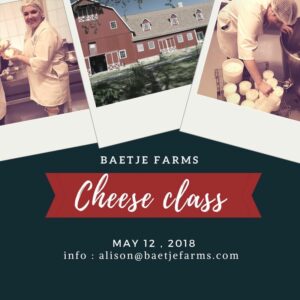
Cheese Class and Farm Tour Overview:
Presentation on how we developed our on-farm educational tourism program
Developing Class Elements:
See the attached case study materials of our own farm Food Safety, Biosecurity, and Good Manufacturing Practices and a template on how we developed policies for on-farm educational tourism.
Food-Safety-and-Biosecurity-Policy-Considerations1
Educational & Outreach Activities
Participation summary:
Baetje Farms LLC
On-Farm Educational Programming: A Cheesemakers Perspective began with two on-farm cheese classes. These classes did not prove to be profitable and sustainable so we reset the program offering educational programming in the form of tours at a lower cost which included a history, tour of the barn and milking parlor, and concluding with a cheese tasting.
CHEESE-CLASS-2-Cheese making step by step
Recipes provided during the cheese classes:
Baetje-Farms-CHEVRE-Cheese-recipe
FETA-CHEESE-BAETJE-FARMS-STYLE3
Cheesemaking resources:
ACS-Best-Practices-Guide-for-Cheesemakers-Second-Edition-Feb2017
2696 S. Colorado Blvd., Ste. 570
Denver, CO 80222
https://www.cheesesociety.org
720-328-2788
Publication/product ID: Best Practices Guide For Cheesemakers
Cost: $175.00
Learning Outcomes
What we discovered is that in our experience there was a lot of interest for coming to the farm and learning about cheesemaking, however though we received a lot of interest, there were few that wanted to actually pay the required cost. We began with asking $600, this included a weekend class with overnight accommodations at Chaumette, a wine and cheese pairing, dinner, breakfast and lunch, and two days of cheese class. We had one interested and willing to pay for this type of class. We were disappointed as we felt the cost was quite affordable for all they were going to receive. We ended up dropping the class to a one-day event and providing lunch. For 8 hours of one-on-one education we charged $250.00 -- in doing so we were able to host two classes. At this cost we did not feel it was profitable enough to continue this long term so we reset the program to offer "On-Farm Tours". These "On-Farm Tours included a brief history of Baetje Farms, a tour of the barn and milking parlor, and concluded with a cheese tasting. This proved much more profitable as many customers did not mind spending $15 per person and many purchased cheese to take home after the tour.
Project Outcomes
What we discovered is that in our experience there was a lot of interest for coming to the farm and learning about cheesemaking, however though we received a lot of interest, there were few that wanted to actually pay the required cost. We began with asking $600, this included a weekend class with overnight accommodations at Chaumette, a wine and cheese pairing, dinner, breakfast and lunch, and two days of cheese class. We had one interested and willing to pay for this type of class. We were disappointed as we felt the cost was quite affordable for all they were going to receive. We ended up dropping the class to a one day event and providing lunch, for 8 hours of one on one education we charged $250.00 in doing so we were able to host two classes. At this cost we did not feel it was profitable enough to continue this long term. What we did find to be more profitable resulted in offering On Farm education in the form of educational tours. These tours were held multiple times (aprox. 6) We offered a history of our operation, tour of the barn, milking parlor and ended the tour with a cheese tasting. We had groups as few as 6 and as many as 32.
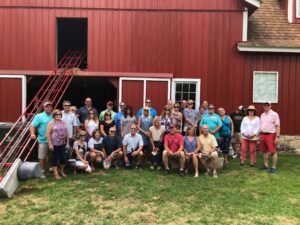
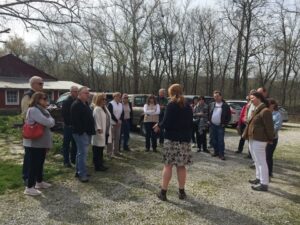
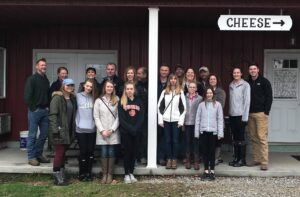
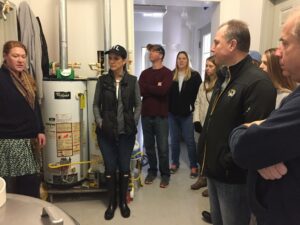
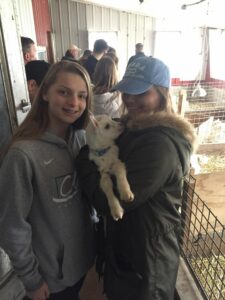
Our recommendation is to evaluate your demographics. How close are you to a major city? Typically those that live in rural areas will not be your customers in On Farm educational offerings as they feel they do not want to pay the cost and that they already have opportunities to teach themselves. Our customers came from urban areas who were "foodies", current customers, and those chefs wanting to learn the craft. Also analysis will need to be done as to what the market can bear. Personally I did not feel we were asking too much for the class at the initial $600 stage especially when it was coupled with staying and eating at a beautiful winery destination, receiving education from an authentic French cheese educator, and spending time working in an award winning cheese company. Even after we reduced the cost to $250 we had a total of 5 students altogether over a period of two classes. Most felt that the class should be under $100. To offer a class on that level would not be feasible for us in any form; we would not be able to give more than 1.5 hours of our time and the customer would not receive a proper education. This type of education is for a select group. However, we did advertise using social media and our local radio station and did not spend more than $100 for advertising. Perhaps a targeted promotion of a project of this nature with an expanded advertising budget would have brought more students? In evaluating our project we had to reset our offering and discovered the best option for us was to offer lower budget "On-Farm tours" at a cost of $15 per person, this tour included a brief history of Baetje Farms, tour of the barn, milking parlor, and finishing with a cheese tasting. These tours proved more successful and better economically as many visitors also purchased cheese to take home.